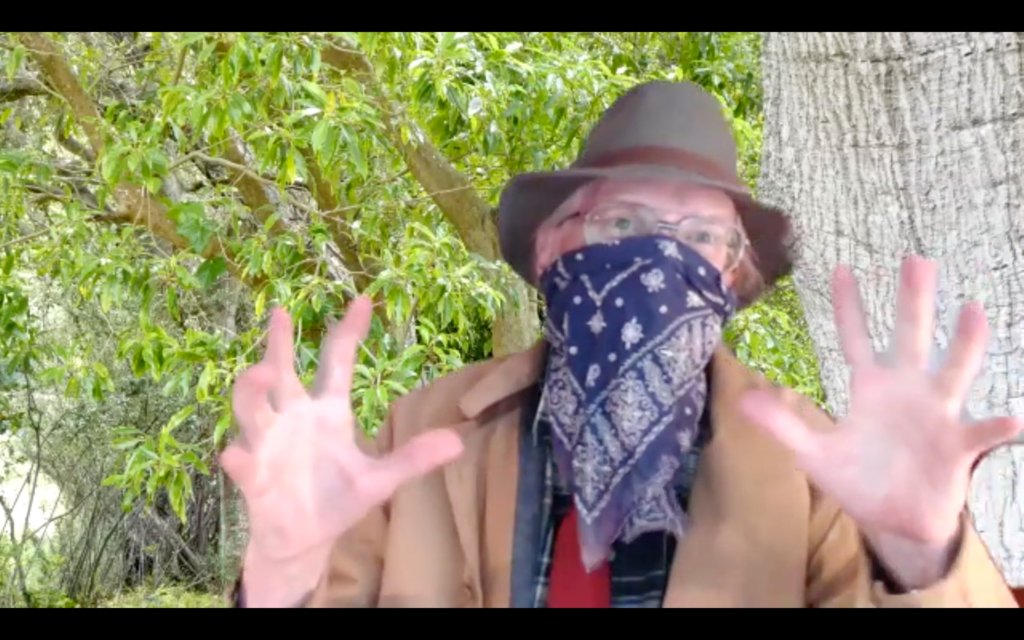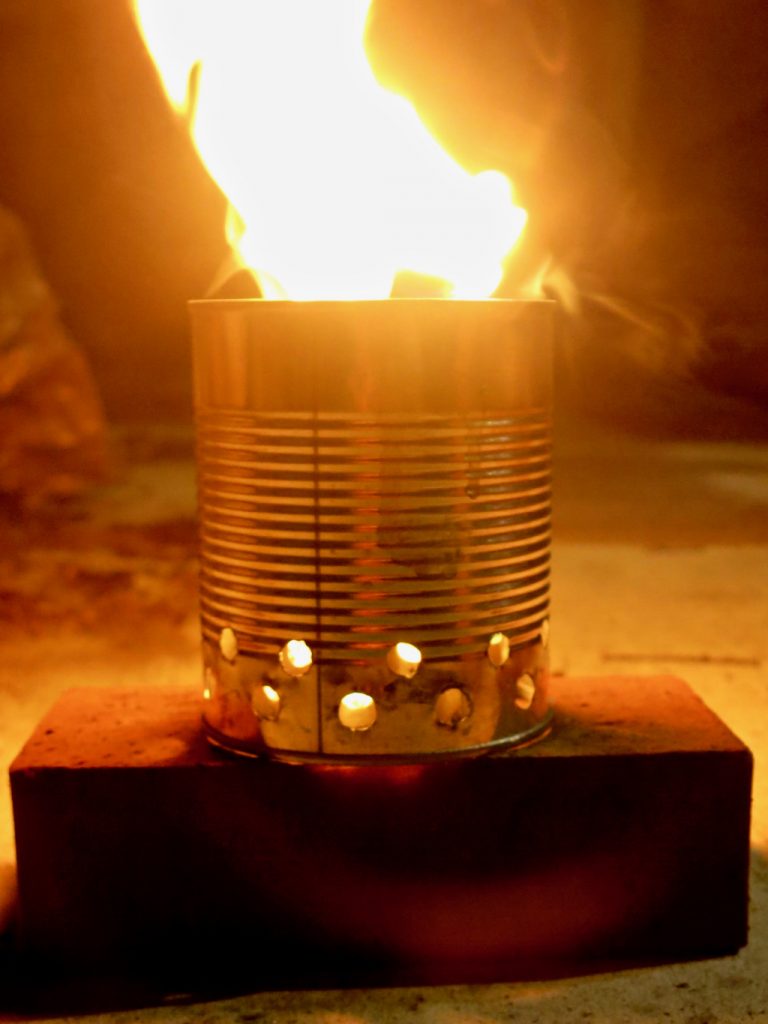The first installment of the Ecojustice Avenger series:

Yet Another Unitarian Universalist
A postmodern heretic's spiritual journey.
The first installment of the Ecojustice Avenger series:

The middle school ecojustice class has extended their rainwater collection project into the restrooms of our congregation:

(And yes, I did flush using rainwater.)
For some time, I’ve been thinking about making a lightweight portable stove that burns biomass instead of fossil fuels. Search the Web, and you’ll turn up lots of plans for such stoves — tin can rocket stoves, Canadian candle stoves, etc. But most of the plans I looked at seemed overly complicated and not particularly elegant. Then I stumbled on a video titled “How To Make a Wood Gasifier Stove”: it showed how to make a stove that was simple, even elegant. So tonight I made one.
The basic principle for the “wood gasifier stove” is the same as for a rocket stove: the solid biomass fuel (wood) burns at the bottom of the stove, with another combustion area higher up where rising gases are enabled to burn further. This is supposed to extract more heat from the fuel, and additionally the more complete combustion should result in less crud going into the air and into your lungs. However, where the rocket stove has been tested for greater efficiency by scientists, I know of no such studies for this design; we’ll just take it on faith that this design is probably more efficient than an open fire.

The stove requires two “tin” cans, one larger than the other: I got a 15 oz. can of pears, and a 29 oz. can of peaches. The smaller can, nested inside the larger can, is where you build the fire. Ventilation holes at the bottom of the larger, outer, can line up with ventilation holes at the bottom of the smaller, inner, can. The smaller can also has a row of ventilation holes near the top; this is where additional air is injected so to make rising gases can burn. If you look carefully at this photo of the stove I made, you can see the upper ventilation holes, with jets of flame coming out where the injected air is igniting rising gases.

I completed the basic stove in about an hour (including the time it took to eat the pears). The stove is reasonably practical, particularly for car campers or ordinary backpackers (i.e., not those crazy ultralight backpackers). And the stove is environmentally responsible: it’s made with recyclable materials, and it burns biomass instead of fossil fuels like white gas, butane, or propane. Plus, since it’s homemade, it doesn’t feed consumer consumption; and consumerism is a major contributing cause to the pending global environmental disaster.
I still have to make a potholder, to keep the cooking pot a couple of inches above the flames, where the greatest heat should be — but I have to wait until I eat another can of pears. Once I get the potholder made, I’ll post a photo showing something cooking on the stove (and I’ll add a sketch showing how to make one).
As I look into the economic and political forces driving global environmental collapse, I’ve been researching neoliberalism, an economic doctrine that was first tried on a practical basis under Pinochet in Chile. Neoliberalism now has come to dominate much of the world, including the United States, where neoliberalism is now so entrenched that it represents an unquestioned economic consensus of both major political parties.
Here are two definitions of neoliberalism. The first comes from journalist George Monbiot, author of How Did We Get into This Mess?:
“Neoliberalism claims that we are best served by maximum market freedom and minimum intervention by the state. The role of government should be confined to creating and defending markets, protecting private property and defending the realm. All other functions are better discharged by private enterprise, which will be prompted by the profit motive to supply essential services. By this means, enterprise is liberated, rational decisions are made and citizens are freed from the dehumanising hand of the state….
“[T]he most powerful promoter of this programme was the media. Most of it is owned by multi-millionaires who use it to project the ideas that support their interests. Those which threaten their plans are either ignored or ridiculed. It is through the newspapers and television channels that the socially destructive ideas of a small group of extremists have come to look like common sense. The corporations’ tame thinkers sell the project by reframing our political language…. Nowadays I hear even my progressive friends using terms like wealth creators, tax relief, big government, consumer democracy, red tape, compensation culture, job seekers, and benefit cheats. These terms, all deliberately invented or promoted by neoliberals, have become so commonplace that they now seem almost neutral.
“Neoliberalism, if unchecked, will catalyse crisis after crisis, all of which can be solved only by the means it forbids: greater intervention on the part of the state.”
George Monbiot, from his 2008 article “How Did We Get into This Mess?” (written, you will notice, before the 2008 Depression hit).
The second definition of neoliberalism comes from leftist geographer David Harvey, quthor of A Brief History of Neoliberalism:
“There are two things to be said [about defining ‘neoliberalism’]. One is … the theory of neoliberalism and the other is its practice. And they are rather different from each other. But the theory takes the view that individual liberty and freedom are the high point of civilization and then goes on to argue that individual liberty and freedom can best be protected and achieved by an institutional structure, made up of strong private property rights, free markets, and free trade: a world in which individual initiative can flourish. The implication of that is that the state should not be involved in the economy too much, but it should use its power to preserve private property rights and the institutions of the market and promote those on the global stage if necessary….
“Liberal theory goes back a very long way … to the 18th century: John Locke, Adam Smith, and writers of that sort. Then economics changed quite a bit towards the end of the 19th century and neoliberalism is a really revival of the 18th century liberal doctrine about freedoms and individual liberties connected to a very specific view of the market. And the leading figures in that are Milton Friedman in this country and Friedrich Hayek in Austria. In 1947 they formed a society to promote neoliberal values called the Mont Pelerin Society. It was a minor society but it got a lot of support from wealthy contributors and corporations to polemicize on the ideas it held.”
From an interview with David Harvey, On Neoliberalism: An Interview with David Harvey, in MRonline.
The World Wildlife Federation believes humans have wiped out 60% of vertebrate animals since 1970, according to an article in the Guardian. And global climate change is NOT the culprit:
“The biggest cause of wildlife losses is the destruction of natural habitats, much of it to create farmland.”
Too damn many humans consuming too many resources.
(Handout for a workshop at Ferry Beach Religious Education Week)
ECOLOGY + JUSTICE = ECOJUSTICE
Ecology means making sure all living things are in balance
Justice means making sure humans treat each other, and other organisms, fairly
Learning category — Sample camp activity
8 Core Ecological Concepts
Diversity — Tide pool field trip to look at marine invertebrates and other organisms
Cycles
Energy Flow — Food Chain Game; “Energy from the Sun” song
Interdependence — Web of Life game; “Every Living Thing” song
Change — Lynxes Hares Plants game; “Ballad of Adobe Creek” song
Community — Field trips to 3 ecological communities: redwood forest, marshlands, beach
Adaptation — Bird Beak game; “The Adaptation Song”
Observation skills:
Sensory awareness activities — Wary Wolf; Cautious Coyote; One Fish Two Fish; listening to concert of bird song
Focusing or narrowing perception — Insect observation; Giant magnifier (water lens); binoculars
Recording observations — Field notebooks
Outdoors skills:
Group cooperation — various group building initiatives (Project Adventure games)
Ability to be alone — Alone Time Hike
Food — cooking on overnight; cooking with solar ovens, rocket stoves, open fires
Shelter — learn to set up tent; camping overnight
Travel — hiking; map and compass skills
For photos and more information, visit the Ecojustice Camp Web site.
From “Forget Shorter Showers” by Derrick Jensen (Orion Magazine, 2009), excerpted in the zine “Know Your Shit,” UC Santa Cruz, 2018:
Would any sane person think dumpster diving would have stopped Hitler, or that composting would have ended slavery or brought about the eight-hour workday, or that chopping wood and carrying water would ahve gotten people out of Tsarist prisons, or that dancing naked around a fire would have helped put in place the Voting Rights Act of 1957 or the Civil Rights Act of 1964? Then why now, with all the world at stake, do so many people retreat into these entirely personal ‘solutions’?
“Part of the problem is that we’ve been victims of a campaign of systematic misdirection. Consumer culture and the capitalist mindset have taught us to substitute acts of personal consumption (or enlightenment) for organized political resistance. An Inconvenient Truth helped raise consciousness about global warming. But did you notice that all of the solutions presented had to do with personal comsumption — changing light bulbs, inflating tires, dirving half as much — and had nothing to do with shifting power away from corporations, or stopping the growth economy that is destroying the planet? Even if every person did everything the movie suggested, U.S. carbon emissions would fall by only 22 percent. Scientific consensus is that emissions must be reduced by at least 75 percent world wide….
“I want to be clear. I’m not saying that we shouldn’t live simply. I live reasonably simply myself, but I don’t pretend that not buying much (or not driving much, or not having kids) is a powerful political act, or that it’s deeply revolutionary. It’s not. Personal change doesn’t equal social change.”
Couldn’t’ve said it better myself.
Our personal consumption profiles are not going to stop all the global environmental justice crises. What is going to save us is a combination of political activism and change in the global economic structure; some moral technological innovation (as opposed to the now-dominant amoral technological innovation driven by the profit motive) may help, but only if coupled with political activism and economic change.
Friday was the last day of Ecojustice Camp. This is the fourth year our congregation has sponsored this camp, and each year has been more fun than the last (from the adult leader point of view).
On the plus side, the overnight camping trip went far more smoothly this year; we firmed up the curriculum and added some new camp songs that both campers and adults loved; and we were better about integrating age groups. For the finances, I’m still waiting for all expenses to be submitted but I’m projecting that we’ll run a modest surplus again this year (the surplus provides start-up funds for the following year).
On the negative side, camp took it out of me this year: camp typically means a ten-hour day for me, and my regular duties as a minister get piled on top of that; that’s usually not a problem for just one week, but this year I haven’t fully recovered from some health issues, so I’m pretty well tuckered out. Having said all that, I felt it was completely worth it — it wasn’t just the campers who had a great camp experience, we adults did too.
Above all, it feels like this kind of camp is critically important in today’s world. It’s important to teach kids to enjoy the outdoors, while not shying away from the intertwined issues of environmental justice, racism, sexism, consumerism, etc. I don’t think there’s much hope for the world unless we teach First World kids how to love Nature, and how to save it from ruin.
Above: 6 a.m hike on the Ecojustice Camp overnight. Not many of the campers got up to go on this hike, but those who did had a blast.
In the Winter, 1981, issue, the editors of the magazine Coevolution Quarterly published “Where You At? A Bioregional Quiz,” developed by Leonard Charles, Jim Dodge, Lynn Milliman, and Vitoria Stockley (you can find this quiz online here). The quiz was later republished in the book Home: A Bioregional Reader (New Society, 1990). Since then, others have modified the quiz; most notably, in 2006 Kevin Kelly posted a revised version of this quiz titled “The Big Here” on his blog.
As much as I like the original version of the quiz, some of the questions are specific only to certain bioregions, such as “What spring wildflower is consistently among the first to bloom where you live?” — if you live in a region where flowers bloom year-round, there is no good answer to that question. And some of the questions are maybe too difficult, such as “Name five grasses in your area” — I’ve been trying to learn how to identify grasses down to the species level, and it’s very challenging. A couple more things bother me about the quiz. First, the quiz focuses too much on book knowledge; you are merely asked to “Name five resident and five migratory birds,” you are not asked to identify them in the field. Second, the quiz ignores whole clades of organisms that would have been familiar to indigenous peoples, such as invertebrates and non-vascular plants.
So I’ve been thinking about how to revise the quiz. I wanted to create a quiz that would prompt me to learn more about my watershed, and to encourage me to get outdoors and explore that watershed. The first draft of my quiz appears below. How many answers did you get? What did I leave off that I should have included?
The poet Lew Welch wrote: “I like the idea of giving my readers a text they can perform, themselves. Far too many of our pleasures are spectator sports already…” (introduction to Ring of Bone). The way I like to perform poetry is to write out a fair copy of the poem.
A couple of weeks ago, Carol and I went to the city and stopped in at City Lights Bookstore. I sat in the Poetry Room leafing through books and found the poem “Global Warming Blues” by Mariahadessa Ekere Tallie, in The BreakBeat Poets: New American Poetry in the Age of Hip-Hop (Haymarket Books, 2015). I almost bought the book, but I just got rid of four hundred books so we could fit into our new apartment; no way I could justify buying a new book for just one poem. So I performed the poem by writing out a fair copy on some watercolor paper. I tucked the poem into my coat pocket and forgot about it.
I carried the poem around in my coat pocket. The paper got wrinkled, and the poem got smudged though it was still perfectly legible. Maybe that’s a metaphor for what’s supposed to happen to poetry: poems aren’t supposed to remain captive inside the pristine covers of a book sitting on a bookshelf; poems are supposed to be out in the world: objects of use rather than useless objets d’art. I re-read the last paragraph:
now my town is just a river
bodies floatin, water’s high
my town is just a river
but I’m too damn mad to cry
seem like for Big Men’s living
little folks has got to die